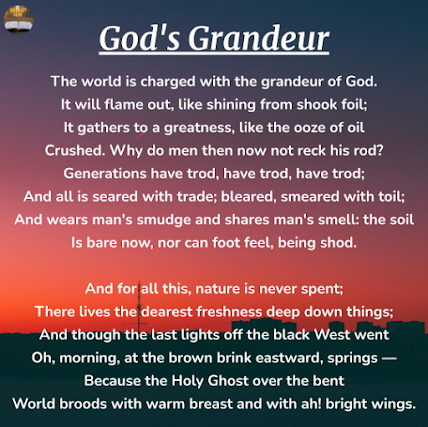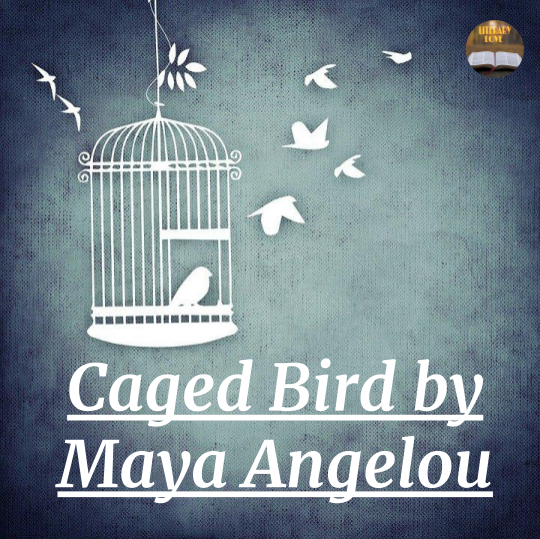God's Grandeur by Gerard Manley Hopkins
The world is charged with the grandeur of God.
It will flame out, like shining from shook foil;
It gathers to a greatness, like the ooze of oil
Crushed. Why do men then now not reck his rod?
Generations have trod, have trod, have trod;
And all is seared with trade; bleared, smeared with toil;
And wears man's smudge and shares man's smell: the soil
Is bare now, nor can foot feel, being shod.
And for all this, nature is never spent;
There lives the dearest freshness deep down things;
And though the last lights off the black West went
Oh, morning, at the brown brink eastward, springs —
Because the Holy Ghost over the bent
World broods with warm breast and with ah! bright wings.
INTRODUCTION -
"God's Grandeur" is a remarkable poetic work by the English Jesuit poet, Gerard Manley Hopkins. The poem was written in 1877 but it was published posthumously in 1918 in the collection 'Poems of Gerard Manley Hopkins.' It is considered Hopkins' most famous work. The poem is an Italian or a Petrarchan Sonnet. It means that the fourteen lines are divided into an octave (eight-line stanza) and a sestet (six-lines stanza). They can be further divided into two quatrains and two tercets. The poem follows a standard Italian rhyme scheme of ABBAABBA CDCDCD and there are unique poetic meters. The word "grandeur" comes from French which means grandness or magnificence. In this poem, Hopkins conveys his admiration for the magnificence of God and nature and his desperation about the way humanity has seemed to lose sight of the close association between them.
POET -
Gerard Manley Hopkins (28 July 1844 – 8 June 1889) was a Victorian poet. He is best known for his use of sprung rhythm and his invention of the unique curtal sonnet. His works usually carried themes of nature and religion. His best works include God’s Grandeur, The Sea and The Skylark, Pied Beauty, The Windhover, etc.
SUMMARY -
In the octave, the speaker describes the natural world where the beauty of God's creation runs like an electric current charging it. This beauty will become instantly evident in flame-like flashes that mirror the sparkling of a metal foil when moved in the light. Next, he describes God's presence as a rich oil whose true power or greatness is only revealed when crushed to its essence. This leads the poet to wonder why the humans are not acknowledging God's presence and showing Him their explicit devotion and dedication. In the next line, he answers himself by mentioning that humans have lived and walked on this earth endlessly. Further, their industrial and economic pursuances have damaged and corrupted the landscape in such a way that it looks and smells only of men and not of God. The land has become bare as there are no more living beings to live upon it. Even the shoes that people now wear have cut off the physical connection between their feet and the earth they walk on. Hence, humans have lost their total connection with God and nature.
In the sestet, the speaker holds for nature and God. He says that nature never loses its power. Below all this industry and infertility, life continues to grow and nurture. Though the sun will always fade into the darkness of night in the west, the morning will always follow by springing up over the edge of the horizon in the east. Darkness can not stop light from making its way. The reason for this continuity of rehabilitation is the grace of God who guards this broken world like a mother bird using its body to watch over and keep its eggs and hatchlings warm.
THEMES -
- God, Nature, and Man - The poem's very first line establishes the intense bond between God and nature that the speaker explores throughout the poem. God is not connected to nature merely because God created it. Rather, the speaker describes God as actively suffused within nature, as an ever-present "charge" running through it. The speaker worships nature not only because it is a divine creation, but also because it is a direct channel between humanity and God.
- Industrialization - The poem is written during the midst of the Second Industrial Revolution. Hence, it was affected by the rapid technological advancement during that period. Technology and industry, though considered as the blessings of science, have driven us away from nature and God. The speaker of the poem laments the destruction of nature and the reckless way that humanity is engaging in its destruction.
END -
The poem is symbolic and uses different literary devices to express its innermost meaning. The poem shows a deep connection between God, nature, and humans. Humans in their selfishness are harming and destroying nature, forgetting the fact that God is an unbreakable part of nature. The poem explores this relationship between God and the world of nature, how the divine is infused in things and refreshes them, despite the efforts of humans to ruin the whole.











1 Comments
Thank you
ReplyDelete